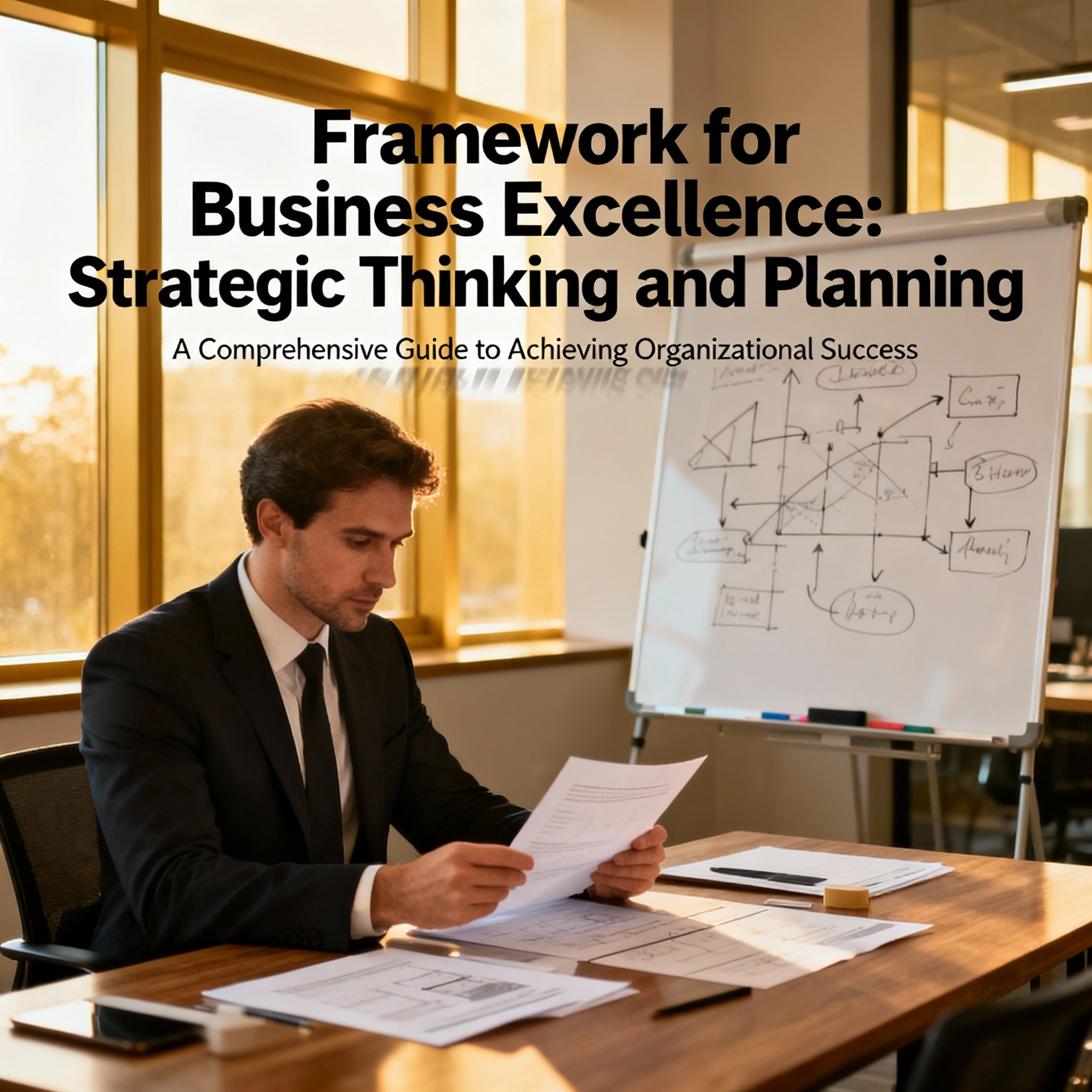Currently Empty: $0.00
Share This Course
01
Introduction
Introduction
02
Objectives
Objectives
03
Who Should Attend?
Who Should Attend?
04
Training Method
Training Method
05
Course Outline
Course Outline
In an era of relentless competition and disruptive change, achieving and sustaining business excellence requires more than incremental improvement—it demands a rigorous, structured approach to strategy. This course provides that framework. It bridges the critical gap between high-level strategic thinking and practical, executable planning, moving beyond theoretical models to a holistic system for organizational success.
This program integrates world-class excellence models—such as the Baldrige Performance Excellence Framework and the EFQM Model—with proven strategic management tools. Participants will learn to diagnose organizational strengths and weaknesses, think systemically about their business, formulate powerful strategies, and translate them into aligned action plans that drive measurable results, foster innovation, and create a culture of continuous improvement.
Upon completion of this course, participants will be able to:
-
Understand Business Excellence Frameworks: Articulate the core principles and criteria of major excellence models (e.g., Baldrige, EFQM) and use them as a diagnostic tool.
-
Conduct a Comprehensive Strategic Analysis: Systematically assess the internal and external environment using advanced tools (PESTLE, Porter’s Five Forces, VRIO) to identify strategic priorities.
-
Formulate a Coherent Strategy: Develop a clear mission, vision, and values, and formulate strategic objectives that leverage organizational strengths to capitalize on opportunities.
-
Translate Strategy into Action: Cascade strategic objectives into departmental and individual goals using frameworks like the Balanced Scorecard (BSC) and OKRs (Objectives and Key Results).
-
Design for Execution and Agility: Establish robust performance measurement systems, governance routines, and feedback loops to ensure strategy execution and enable adaptive learning.
-
Foster a Culture of Excellence: Lead the cultural and behavioral changes necessary to embed strategic thinking and a results-oriented mindset throughout the organization.
This course is designed for leaders and professionals responsible for shaping, communicating, and executing organizational strategy and driving performance improvement.
-
C-Suite Executives & Business Unit Heads (CEO, COO, CFO, VP of Strategy)
-
Directors and Senior Managers of Operations, Business Development, and Performance Excellence
-
Strategic Planners, Quality Directors, and Excellence Managers
-
Project and Program Managers overseeing strategic initiatives
-
High-Potential Managers being groomed for senior leadership roles
-
Management Consultants and Internal Advisors focused on organizational performance
• Pre-assessment
• Live group instruction
• Use of real-world examples, case studies and exercises
• Interactive participation and discussion
• Power point presentation, LCD and flip chart
• Group activities and tests
• Each participant receives a binder containing a copy of the presentation
• slides and handouts
• Post-assessment
Day 1: The Foundation – Principles of Business Excellence
-
Morning:
-
Module 1: Introduction to Business Excellence: Defining “excellence.” Overview of holistic frameworks: The Baldrige Framework, EFQM Model, and others.
-
Module 2: The Systems Perspective: Understanding your organization as an interconnected system. The role of leadership, strategy, and customers.
-
-
Afternoon:
-
Module 3: Organizational Self-Assessment: Using the excellence framework criteria to conduct a high-level organizational health check.
-
Workshop: The Leadership Lens: Participants assess their organization’s leadership and governance practices against excellence criteria.
-
Day 1 Recap: Diagnosing the starting point.
-
Day 2: The Strategic Thinker’s Toolkit – Analysis & Diagnosis
-
Morning:
-
Module 4: External Environmental Scan: Advanced application of PESTLE analysis and Porter’s Five Forces to understand the competitive landscape.
-
Module 5: Internal Capability Analysis: Identifying core competencies and strategic advantages using the VRIO framework (Value, Rarity, Imitability, Organization).
-
-
Afternoon:
-
Module 6: SWOT to Strategic Implications: Moving from a simple list to a prioritized set of strategic challenges and opportunities.
-
Workshop: The Strategic Situation Analysis: Teams analyze a case study company (or their own) to define key strategic issues.
-
Day 2 Recap: From information to insight.
-
Day 3: The Architect’s Blueprint – Formulating Strategy
-
Morning:
-
Module 7: Defining Organizational Direction: Crafting a compelling mission, vision, and set of values that guide strategic choice.
-
Module 8: Strategy Formulation: Developing strategic pillars and objectives. Introduction to strategy maps for visualizing cause-and-effect relationships.
-
-
Afternoon:
-
Module 9: Making Strategic Choices: Evaluating strategic options using decision matrices. Allocating resources to strategic priorities.
-
Workshop: Building the Strategy Map: Teams develop a strategy map for their case study or organization, linking objectives across perspectives.
-
Day 3 Recap: Creating the master plan.
-
Day 4: The Engineer’s Plan – Translating Strategy into Action
-
Morning:
-
Module 10: The Balanced Scorecard (BSC) & OKRs: Translating strategic objectives into measurable KPIs, targets, and initiatives.
-
Module 11: Cascading and Alignment: Ensuring departmental, team, and individual goals are directly aligned with the organizational strategy.
-
-
Afternoon:
-
Module 12: Initiative Management & Governance: Selecting and managing strategic projects. Establishing a governance rhythm for strategy review (e.g., quarterly strategy reviews).
-
Workshop: Developing a Scorecard: Teams define KPIs and targets for the objectives on their Day 3 strategy map.
-
Day 4 Recap: Bridging the strategy-to-execution gap.
-
Day 5: The Catalyst’s Role – Leading Execution and Sustaining Excellence
-
Morning:
-
Module 13: Leading Strategic Change: Communicating strategy effectively and managing the human and cultural barriers to execution.
-
Module 14: Building a Culture of Continuous Improvement: Integrating operational excellence (Lean, Six Sigma) with strategic learning and adaptation.
-
-
Afternoon:
-
Capstone Activity: The Integrated Strategic Plan: Participants integrate their work from the week into a one-page strategic plan or a concise strategic document for their organization.
-
Final Presentations & Peer Feedback: Teams present their strategic plans and receive constructive feedback.
-
Course Conclusion: Commitment to action, final review, and awarding of certificates.
-
- Course Details
- Address
Damascus
- Location
- Phone
+963 112226969
- Fees
300 $
More Course

Cloud Mastery Build Deploy Scale #259011
Fees : $ 300

Data Encryption Mastery Deep Dive into Cybers #259010
Fees : $ 300
Start Date : December 14, 2026
End Date : December 18, 2026
Type Of Course : Offline Course
Location : Damascus
Course Category : Cyber Security & Technology

Data Encryption Mastery Deep Dive into Cybers #259010
Fees : $ 300
Start Date : July 27, 2026
End Date : July 31, 2026
Type Of Course : Offline Course
Location : Damascus
Course Category : Cyber Security & Technology

Data Encryption Mastery Deep Dive into Cybers #259010
Fees : $ 300
Start Date : March 9, 2026
End Date : March 13, 2026
Type Of Course : Offline Course
Location : Damascus
Course Category : Cyber Security & Technology

Cybersecurity with Cybers A Practical Approach #259009
Fees : $ 300
Start Date : December 7, 2026
End Date : December 11, 2026
Type Of Course : Offline Course
Location : Damascus
Course Category : Cyber Security & Technology

Cybersecurity with Cybers A Practical Approach #259009
Fees : $ 300
Start Date : July 20, 2026
End Date : July 24, 2026
Type Of Course : Offline Course
Location : Damascus
Course Category : Cyber Security & Technology

Cybersecurity with Cybers A Practical Approach #259009
Fees : $ 300
Start Date : March 2, 2026
End Date : March 6, 2026
Type Of Course : Offline Course
Location : Damascus
Course Category : Cyber Security & Technology

Real World Cyber Security Hands On Training #259008
Fees : $ 300
Start Date : November 30, 2026
End Date : December 4, 2026
Type Of Course : Offline Course
Location : Damascus
Course Category : Cyber Security & Technology

Real World Cyber Security Hands On Training #259008
Fees : $ 300
Start Date : July 13, 2026
End Date : July 17, 2026
Type Of Course : Offline Course
Location : Damascus
Course Category : Cyber Security & Technology

Real World Cyber Security Hands On Training #259008
Fees : $ 300
Start Date : February 23, 2026
End Date : February 27, 2026
Type Of Course : Offline Course
Location : Damascus
Course Category : Cyber Security & Technology

future centre Join our platform to access flexible learning, expert instructors, and industry-relevant courses designed to help you succeed in your career
Categories
© Copyright 2026 Future Centre | All Rughts Reserved
Sign In
or sign in with email
The password must have a minimum of 8 characters of numbers and letters, contain at least 1 capital letter
Years of experience in teaching
Choose your academic specialty
Country/Region
Your Address
Your Address
Upload Your Resume
Upload file
Supported file formats
Drag file here or click the button.
.png, .jpg, .jpeg, .mp4, .pdf
Uploading...
Terms & Conditions
By selecting this option, you confirm that you agree to the Terms and Conditions

